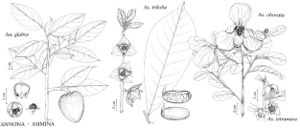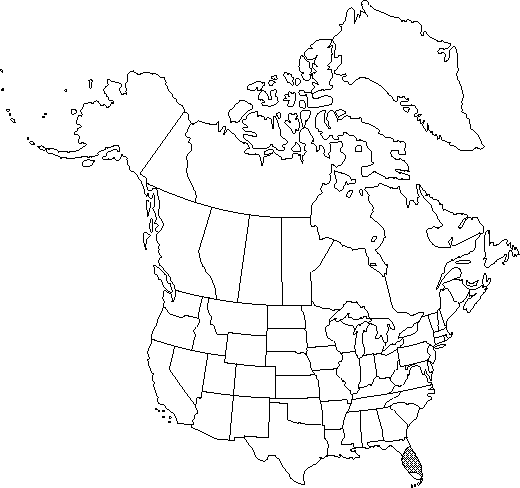Difference between revisions of "Asimina obovata"
Bull. Torrey Bot. Club 23: 240. 1896.
FNA>Volume Importer |
imported>Volume Importer |
||
| Line 84: | Line 84: | ||
|publication year=1896 | |publication year=1896 | ||
|special status=Endemic;Illustrated | |special status=Endemic;Illustrated | ||
| − | |source xml=https:// | + | |source xml=https://bibilujan@bitbucket.org/aafc-mbb/fna-data-curation.git/src/bb6b7e3a7de7d3b7888a1ad48c7fd8f5c722d8d6/coarse_grained_fna_xml/V3/V3_620.xml |
|genus=Asimina | |genus=Asimina | ||
|species=Asimina obovata | |species=Asimina obovata | ||
Revision as of 23:03, 27 May 2020
Shrubs or small trees, 2-3(-4.5) m, much branched. New shoots densely tomentose, hairs bright red, maturing glabrous. Leaves: petiole 2-6 mm, hairs bright red. Leaf blade obovate to oblong, oblanceolate or ovate, 4-10(-12) cm, leathery, base rounded to broadly cuneate, margins scarcely to prominently revolute, apex rounded to obtuse, often notched; surfaces abaxially densely hairy along veins, later sparsely so, hairs bright red, adaxially sparsely red-hairy, maturing glabrous, lustrous. Inflorescences terminal on new growth, sometimes directly from axils of previous season; peduncle usually erect, shootlike, to 0.5 cm, tomentose, hairs bright red; bracts leafy, often with 1-2 bracteoles basally. Flowers yellow-white with lemony fragrance, large; sepals elliptic to ovate, 5-15 mm, adaxially red-hairy; outer petals spreading, elliptic to obovate, 4-6(-8) cm, veins abaxially puberulent, glabrescent, impressed adaxially; inner petals incurved, rarely pink or red, oval to oblong, rarely lanceolate, 1/5-1/2 length of outer petals, thick, base slightly saccate, corrugate zone adaxially purple; pistils 3-8(-11). Berries yellow-green, 5-9cm. Seeds brown to chestnut brown, 1-2 cm. 2n=18.
Phenology: Flowering late winter–early summer.
Habitat: White and yellow sand ridges, mostly in oak-pine woods, scrub, coastal dunes, and hammock edges
Elevation: 0-150 m
Discussion
Taller strains of Asimina obovata, particularly those with pink or red inner petals, have great horticultural potential. W.Bartram figured this species adequately, but subsequent authors tended to confuse it and his somewhat similar Annona incana, with which it is sympatric in northern peninsular Florida.
Selected References
None.

